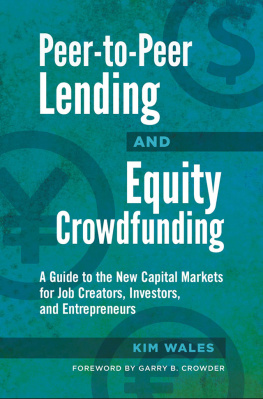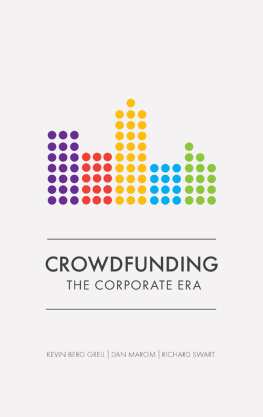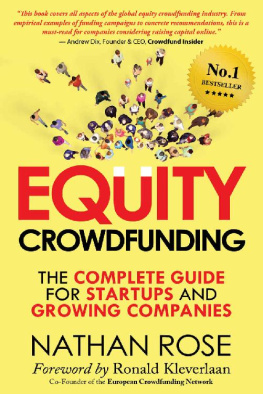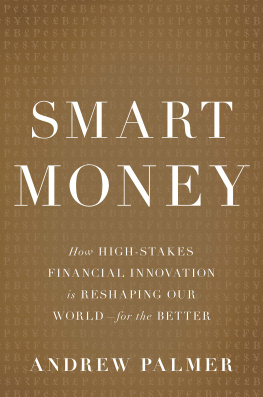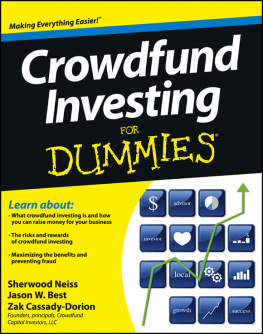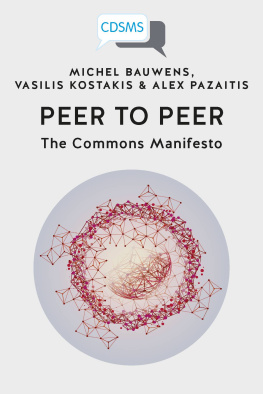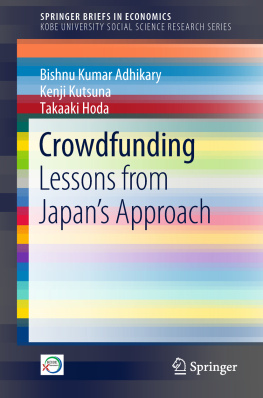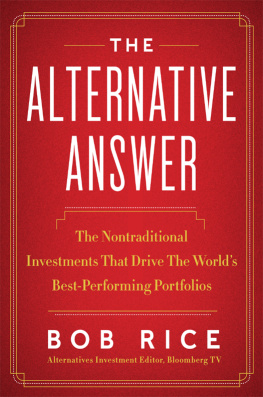A Guide to the New Capital Markets for Job Creators, Investors, and Entrepreneurs
Foreword by Garry B. Crowder
All rights reserved. No part of this publication may be reproduced, stored in a retrieval system, or transmitted, in any form or by any means, electronic, mechanical, photocopying, recording, or otherwise, except for the inclusion of brief quotations in a review, without prior permission in writing from the publisher.
This book is also available as an eBook.
Contents
by Garry B. Crowder
The real tragedy of the poor is the poverty of their aspirations.
Adam Smith
In Greek mythology, Ploutos was the god of wealth and bounty. He dispensed his riches to those he saw as righteous and worthy. Zeus took exception to this approach and blinded Ploutos to ensure that wealth was distributed to mortals based on happenstance and luck rather than on capricious merit. The theme that wealth and its accumulation is a matter of luck is visceral and has survived time. It allows reason and hope to those who have not achieved monetary comfort as well as a shield to those who have.
The research and analysis underlying Peer-to-Peer Lending and Equity Crowdfunding challenges this theme. Through exhaustive research, Kim Wales holds forward the belief that self-determination, discipline, and awareness are the true keys to building and sustaining wealth. In so doing, Kim has designed a complex narrative that guides the reader through both the legal constructs of peer-to-peer lending and crowdfinance and their social promise. She notes that these business models are the result of recent economic crises and that, as with all crises, a new language emerges.
We now have umbrella terms such as mutualization, sharing economy, democratization of wealth, and shared society. These are umbrella terms because they have no exact meaning, with each country providing a different context. These terms escape precise definition because they embrace abstracts. Kim deconstructs the texture of those abstracts. She believes that there are layers within their meaning. Her starting point is a sense that the social contract has been broken, governments have failed to serve and protect, financial markets are not fair, and the wealthy have undue advantages. Underlying this last point is the genuine belief in todays world that wealth has been unfairly restricted and therefore we must live with less.
Yet, within these umbrella terms, Kim sees hope. That hope relies on a reordering of society and economic relationships. Peer-to-peer lending and crowdfunding are expressions of that hope. They are also expressions of the recurring universal theme of the fight for individual self-determination and a meaningful place within a capitalist society.
Within Kims analysis, the fight starts with the family unit. It is here that through financial literacy and basic savings programs that societies begin the journey of acting as a collective for mutual benefit. Embedded within her concept is the promise of communities pooling and leveraging savings to invest and thus, through credit, encourage innovation, the entrepreneur, and the new idea, and, hence, a better way of life. Against this promise, history has shown that inequalities of wealth and opportunities are persistent threats. Modern capitalism is a system of accumulation, leverage, and credit. There is a constant tension between those who would unjustly profit from the system and those who would build a better society.
The accumulation and maintenance of genuine wealth requires an infrastructure. And, that infrastructure must be managed. Countless times significant portions of that infrastructure have been seized by managers who would hoard societies wealth and credit for their own means. This hoarding is not the result of random acts of favors by the gods. There is no true lottery at work. No Ploutos as a brooding omnipresence. Rather, it is a systematic approach of tilting the scales of economic progress through self-dealing, inappropriate fees and tolls, a lack of transparency, and false promises.
Over the centuries, we have witnessed the destruction of family wealth by those who have been charged with controlling the accumulated wealth and credit of communities. Concomitantly, we have witnessed these managers stifle ideas and progress by either ignoring the merit of new ideas or exacting such unfair tolls on credit as to render their implementation impossible. In the early 1900s, Woodrow Wilson and Louis Brandeis, noting that the then-current manager or moneyed class held no monopoly on the future or on ideas of merit, led the battle against those who would destroy the American economic system by denying fair credit to the inventions of unknown men... and ambitions of unknown men. Their combined work unmasked the moneyed classs self-dealing and led to the passage of the Securities Act of 1933 and the Securities Exchange Act of 1934. While these legislative initiatives and their progeny offer a complex web of market regulation and structure, their fundamental premise is that the fuel of capitalism is complete transparency and fundamental fairness in the conduct and operation of the nations securities markets.
Every country has its own collection of stories of how a moneyed class misappropriated the wealth and credit of communities to further its own ends. Most recently, in the United States, we have the savings and loan crisis of the 1980s and 1990s, the junk bond crisis of the 1990s, the dot-com bubble of 19901991, and, the 20072008 financial crisis. In each, the crisis was global; in each, a moneyed class collaborated to control and dispense credit to a chosen few based on the wants or needs of the class. In each, there was a complete lack of transparency as to who received fees and why and whether such fees were compensation for actual risk. In each, the publics reliance on an independent rating system was proven to be misplaced. And, in each, the monies of the ordinary investor through their bank deposits, pension plans, and direct purchases funded the run-up in valuations. When these artificial markets collapsed, these same investors absorbed a disproportionate share of the losses that in many cases could only be described as catastrophic.
Interestingly, while each of the forgoing financial crises reflect an enormous destruction of wealth and a corresponding institutional betrayal of public trust, only the financial crisis of 20072008 was accompanied by a global populist reform movement not seen since the early 1900s. Some commentators trace this populist movement to the emergence of the Internet, severe austerity, and the political paralysis of the period. In so doing, they point to the Internet as a transformative vehicle of communication and expression that permitted universal shared experiences without the preexisting societal filters of sovereign borders, establishment newspapers, or government bureaucracies. The absence of filters allowed a frontal assault on economic and social dogma.

